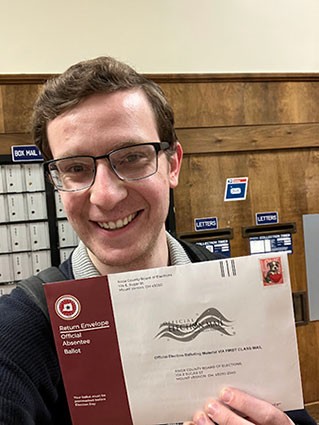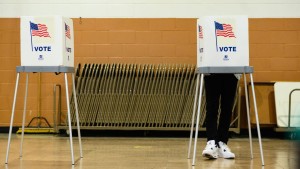
Joseph Ferrari ’24 wants to help make voting a lifelong habit for his fellow students. That’s why he’s spent hours with his fellow student associates at the Center for the Study of Democracy (CSAD) helping to register them to vote and creating a voter guide for the March 19 primary election.
“There are going to be some elections that are higher profile and get more media attention than others, but that doesn’t mean they’re more important,” the political science major from Maryland said. “A lot of the most important decisions are made at the local level and in primary elections.”
The voter guide is being distributed to the campus community through a series of emails and is available online to the public.
“It’s hard to get information on a lot of these candidates if you’re just a voter,” said Ferrari, who also tabled in Peirce Hall to register students to vote prior to the Feb. 20 deadline. “We think there’s value in finding what information we can, either through the Internet or reaching out to candidates directly.”
For several years, CSAD’s student associates have worked on voter guides for general elections in November, but they decided to expand their efforts this spring due to the number of contested primary races locally, especially within the Republican Party, according to Nancy Powers ’83, assistant professor of political science and associate director of CSAD.
“We're trying to provide a service that helps the entire community,” she said. “Our focus has always been on the races that don't get covered much.”
The process has been full of educational opportunities for students, including learning about local government and how to write in a direct, neutral style for a nonpartisan entity, Powers said.
“We've been really pleased with the project,” she said.
This year, Democrats have fielded primary challenges for the state Supreme Court race and president. The Republican ballot, however, includes multiple candidates for county commissioner, sheriff, state representative, the 5th District Court of Appeals, president and U.S. Senate.
In some cases — including the race for sheriff and one of two county commissioner seats — there is no candidate from the Democratic Party, so whoever wins the Republican primary will be the next person to hold that office. Ohio law allows voters to vote for whatever party they wish in primaries.
CSAD also is hosting a candidates debate on Tuesday, Feb. 27 at 6 p.m. in Oden Auditorium. Sponsored by the Knox County Young Republicans, the free event will include Republican candidates for sheriff and county commissioner — there are no contested races for these offices on the Democratic side — and be moderated by Joseph L. Klesner, CSAD director and a professor of political science and international studies.
Powers, who lives in Gambier, said she’ll be using the student associates’ guide to assist her own voting and encourages others to join her.
“I'm going to look at all the work my students did,” she said. ‘It’s good work that can help people.”
Early voting begins by mail and in person on Wednesday, Feb. 21. Election Day is Tuesday, March 19.
